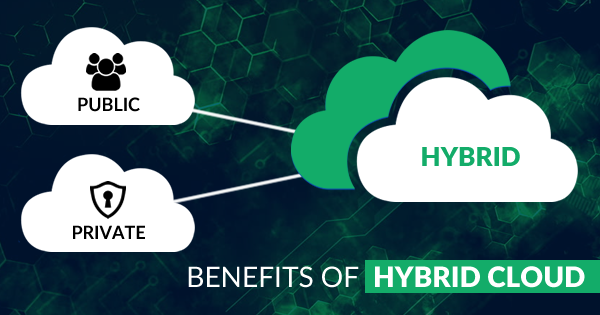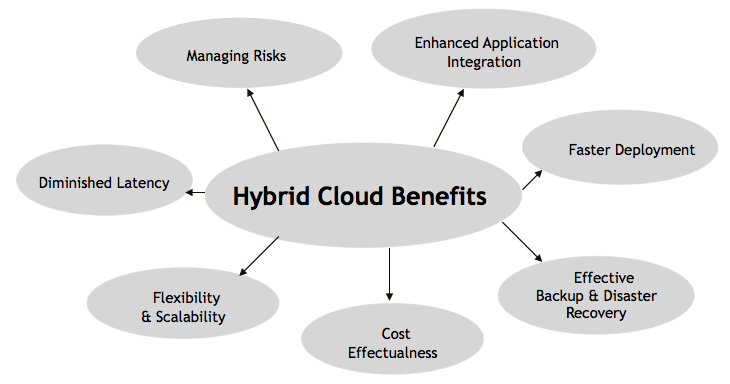Confused while migrating to the hybrid cloud for your business? Understanding the hybrid cloud benefits to your business will help you take the right decision in a go.
The world of IT has witnessed a significant increase in the adoption of cloud computing over the last few years. It is indeed a promising opportunity for both the upcoming and the existing businesses in terms of innovation and development. However, some businesses are still incredulous about the abilities of Cloud Computing to replace and enhance their existing IT environments.
Check Now: Cloud Certifications Training Courses
It’s a renowned fact that the main USP of cloud computing is to provide improved flexibility, efficiency, and a wide scope for expansion. However, most of these stand out features lack an element of tangibility, thereby making the businesses to think twice before migrating to cloud.
What are the Hybrid Cloud Benefits?
Enter the Hybrid cloud model, where the mix of a public or private cloud is done with advanced on-premise solutions. In other words, it is a type of cloud computing strategy, where a user incorporates a combination of multiple environments bound together by a highly efficient, standardized technology that enables easy portability of both the application and data.
But how different is the Hybrid cloud computing from the normal cloud technology? Is it really a good decision for the businesses to switch to the hybrid cloud? To get answers to these questions, you need to understand the hybrid cloud benefits. So, in this blog, we will be taking you through the various advantages of a hybrid cloud service model approach:
-
Flexibility
Flexibility is one of the most stand out advantages in the cloud firmament. The fact is that those who claim the “Flexibility” feature are never able to prove or define it in an apt way. When we use the term flexibility, it simply points towards choices. A Hybrid cloud offers you an array of choices to operate and deliver your IT services. It is one of the important hybrid cloud benefits that allows you to mitigate the risk of choosing just one medium and at the same time, gives you the freedom to take complete advantage of the other delivery methods.
Want to know more about hybrid cloud computing? Read our previous blog on the Introduction to Hybrid Cloud Computing.
-
Cost Effectualness
It’s a harsh truth that the hybrid cloud model doesn’t guarantee a reduction in costs when compared with the conventional standalone or on-premise cloud offerings. But one can still find cost savings in most of the hybrid cloud models when they are implemented for scenarios such as burstable or temporary resources, segmentation of data and application, etc.
This is the hybrid cloud benefit that one can’t ignore. The source of this cost-effectiveness is mostly from maintenance or operational perspective. For example, a lesser number of on-premises servers indicate a lower level of energy consumption caused due to cooling the servers and powering them on. It also means that there would not be too much to think about the management (an effective reduction in human resources or workforce).
-
Improved Security
A hybrid cloud has the potential to increase the security levels to several folds higher when compared to the traditional 100% public cloud implementation. It allows you to keep your sensitive data on a highly dedicated infrastructure on which you have more control, thereby increasing the overall security aspects. Unlike the physical server storage data that might be lying in some unprotected office building, the hybrid cloud benefits offer you the option to store your data in state of the art facilities that are guarded by biometrics and armed guards.
New in the era of Cloud Computing? Let’s start with an introduction to Cloud Computing and the reason behind it’s growing importance.
-
Diminished Latency
One of the common issues that the normal cloud end users face is latency, which is a network issue caused due to unsatisfactorily performing applications. This situation can be very much difficult, at times, to alleviate in middle of employees clogging and streaming the data pipes. And this is where the hybrid cloud benefits come into action. You will be able to implement a direct connection, thereby eliminating the desultory performance of the internet. This will automatically allow you to enhance the overall experience.
In addition to this, if a proper load balancing is incorporated into a hybrid cloud system, it can help you reduce the distance-based latency to a greater extent by ensuring that the infrastructure is getting delivered from the closest location.
-
Managing Risks
Hybrid cloud computing is definitely the sterling way for various organizations to initiate a risk management methodology in the cloud. This is one of the most significant hybrid cloud benefits, required to be mentioned here.
First of all, it would give your organization the option to test non-critical workloads in order to experiment with the various aspects of it. Then, later on, you can gradually move towards the applications that are slightly more sensitive in nature. If this was the case with the traditional cloud systems, it would have eloquently increased your organization’s overall network architecture complexity. This would have then lead to potentially high-security risks.
-
Faster Deployment
Long gone are those days when a company consumed long countless days to deploy their latest infrastructures. With a highly efficient hybrid cloud infrastructure set up in your organization, you will be easily able to automate the overall process of bursting into cloud resources. Moreover, one of the other significant benefits of hybrid cloud architecture is that it also gives you the ability to enable a comparatively faster migration from beta stage to production models.
-
Scalability
When you take into consideration the costs that are incurred for scaling the on-premises IT infrastructure, the charts would always point towards the upper side. And if it is not done in the right way, a massive tide of inefficiency can also be expected along with the rising costs. So, while keeping the scalability factor at the center point, the following questions might cross your mind :
- What’s the accuracy level of your resource utilization projections?
- When is next upcoming massive spike?
- What would be the intensity of the marketing push hit?
- How much time is required for your innovative product to penetrate your market?
So, with the variety of Hybrid Cloud benefits that you can avail, it would be easy for you to rope on your cloud resources to the on-premises that’s required to pacify the prevailing situation. Moreover, you get the leverage to access an unlimited variety of resources on demand through the hybrid cloud model.
The cloud computing industry is quickly growing and advancing with time. Let’s find out which cloud computing trends will be hot this year!
-
Enhanced Application Integration
Most of the applications in the present time provide a built-in hybrid cloud integration. For example, the Hyper-V Replica that has a built-in hybrid cloud capability. You also have the latest technologies such as Stretch Database features from SQL Server, that allows you to immaculately extend your databases from the on-premise location into the cloud. In short, the hybrid cloud computing benefits are the sole reasons why most of the organizations are opting for its implementation.
-
Effective Backup and Disaster Recovery
The implementation of the Hybrid Cloud computing technology makes the task of disaster recovery and backup much easier. For the organizations that are restrained by time or staffing limitations, the hybrid cloud services offer an enhanced system of managed disaster recovery and backup solutions in the standard offering.
Moreover, hybrid Cloud computing services also hold the potential to improve the overall performance and reliable data recovery solution itself. During the scenarios of data loss, it would be a mundane task to restore data from the tapes or various other legacy methods. This can also be more time consuming and a high risk of data loss is involved in it. But as said before, this is not the case with Hybrid cloud services, thus becomes the benefit of hybrid cloud architecture.
Certifications are significant for the professionals to validate and demonstrate their knowledge. Here we enlist top Cloud Computing Certifications in 2018.
If you are opting to proceed ahead with the hybrid cloud computing framework, it doesn’t guarantee you all the above mentioned Hybrid Cloud benefits. There are a number of pros and cons of a hybrid cloud. But if you look at the overall advantages and disadvantages of the hybrid model, these are definitely the advantages of a hybrid cloud service model approach that has a consecutively higher weight.
Final Words
There are various other aspects that can be covered under the Hybrid Cloud benefits such as scenarios where there is an involvement of a dynamic or highly variable workload. But before implementing the hybrid cloud system into your organization, you should always analyze the key factors that are related to the overall operational functionality and database requirement. If your demands meet the benefits of hybrid cloud architecture on offer, it is a must try technology for enhanced functionality of your IT services.
Whether the businesses adopt public cloud, private cloud, hybrid cloud or the multi-cloud they need cloud experts to handle things in their organization. Certified cloud professionals are even in more demand as compared to the non-certified cloud professionals. So, it is recommended to have a cloud certification for better career growth. Whizlabs, pioneering the cloud industry, offers Cloud Certifications Training Courses to help candidates pass the certification exams.
So, join us today and lay the foundation of better tomorrow!
Have any question about hybrid cloud computing? Just write below in the comment section or submit your query at Whizlabs Helpdesk, we’ll respond to you in no time.
- Top 20 Questions To Prepare For Certified Kubernetes Administrator Exam - August 16, 2024
- 10 AWS Services to Master for the AWS Developer Associate Exam - August 14, 2024
- Exam Tips for AWS Machine Learning Specialty Certification - August 7, 2024
- Best 15+ AWS Developer Associate hands-on labs in 2024 - July 24, 2024
- Containers vs Virtual Machines: Differences You Should Know - June 24, 2024
- Databricks Launched World’s Most Capable Large Language Model (LLM) - April 26, 2024
- What are the storage options available in Microsoft Azure? - March 14, 2024
- User’s Guide to Getting Started with Google Kubernetes Engine - March 1, 2024



Hey Neeru,
You did a really great job in compiling the benefits of hybrid cloud. I am looking for this kind of data from a very long time. Keep spreading knowledge.
Thank you for the inspiring words!